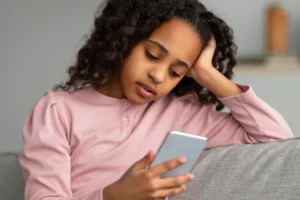What is the Online Safety Bill?
As you may recall, the Bill is all about putting new obligations on tech platforms to protect their users (especially children) from online risks. It also aims to hold them more accountable for what happens on their platforms.
Online safety is a shared responsibility, so it isn’t just up to parents, teachers and children themselves. Instead, this Bill will mean that industry will be expected to do more to keep children safe.
At Internet Matters, we have been digesting the Online Safety Bill amendments and what they mean for parents and carers. It’s a mixed picture of both positives and negatives.
Positive amendments to the Bill
Self-harm content to be criminalised
The Government has expanded the scope of the Online Safety Bill to criminalise material encouraging self-harm. This amendment will require platforms to actively remove content that encourages an individual to physically harm themself. Additionally, users posting such content could face prosecution.
We welcome this significant addition to the Bill and recognise that self-harm comes in many different forms.
Previous Internet Matters research identified the negative impact that online content can have on young people’s self-esteem and body image, including material related to extreme weight loss. In this report, young people expressed concern around seeing people online with ‘perfect’ bodies, and how this can make them feel insecure about themselves. When young people view this type of content once, the platform’s algorithm typically starts to show more of it. This can result in them viewing increasingly extreme content, such as that which promotes anorexia, one form of self-harm.
That said, the criminalisation of this amendment hinges on how the term ‘self-harm’ is defined, and what it includes. As it stands, MPs will come up with a list of topics they believe are harmful. Platforms will then be expected to observe these topics.
Sharing intimate images to be criminalised
Furthermore, under the new amendments, ‘deepfake’ pornography (pornography that is digitally manipulated to feature a different person’s face) and ‘downblousing’ (images and videos secretly taken down a girl or woman’s shirt) will be criminalised. Regulations around sharing, or threatening to share, intimate images and videos without consent will also be strengthened.






